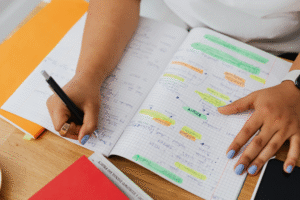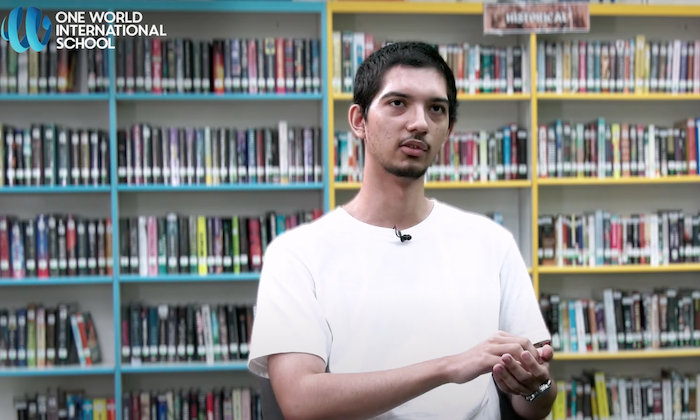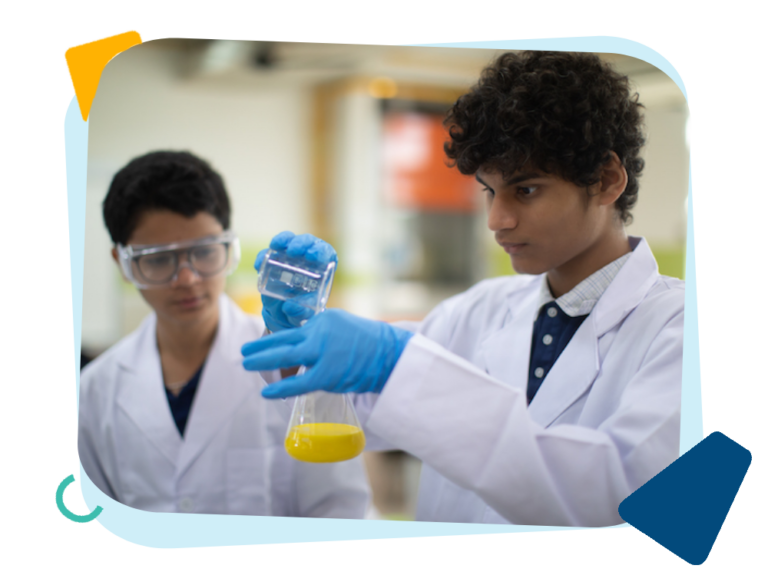As your child begins secondary-level education, they are likely exploring various subject options and considering how these choices will shape their future academic and career paths. At One World International School (OWIS), we believe that a strong foundation in mathematics is essential for success in a wide range of fields.
From geometry to statistics, the Cambridge IGCSE Mathematics curriculum covers a comprehensive range of mathematical concepts. Our guide provides you with a detailed overview of the IGCSE Mathematics syllabus, assessment structure, and how we support your child in their mathematical learning journey.
Why Study IGCSE Mathematics?
Cambridge IGCSE Maths is more than just numbers and equations; it’s a gateway to developing essential skills that are valuable in all aspects of life. Here are some key benefits of studying IGCSE Maths:
- Develop Critical Thinking Skills: IGCSE Mathematics encourages students to gather information, identify patterns, and form reasoned arguments. This ability to think critically is crucial for success in any subject and is a highly sought-after skill in today’s world.
- Hone Analytical Reasoning: Through IGCSE Maths, students learn to break down complex problems into smaller, manageable parts, and apply logical reasoning to arrive at solutions.
- Acquire Problem-Solving Skills: The syllabus presents students with a variety of problems that require them to apply their knowledge and understanding of mathematical concepts to find solutions. This process of applying knowledge in different contexts sharpens problem-solving abilities, a skill that is invaluable in all areas of life.
- Prepare for Higher Education: A strong foundation in IGCSE Mathematics equips students with the necessary knowledge and skills to excel in more advanced mathematical concepts. This foundation primes them for further studies in mathematics at the A-Level, IB diploma, and university levels.
Beyond academics, IGCSE Mathematics gears students up for a range of exciting career paths, such as:
- Engineering: Be it civil, mechanical, or aerospace engineering, all of these fields rely heavily on mathematical principles. IGCSE Maths provides the fundamental understanding of concepts like calculus, trigonometry, and algebra that are crucial for success in this area.
- Economics: This social science uses mathematical models and statistical analysis to understand economic trends and make predictions. The IGCSE Maths curriculum equips students with the necessary tools to pursue further studies in economics and related fields.
- Technology: From computer programming to data science, the rapidly developing field of technology requires a strong understanding of mathematical concepts. IGCSE Maths provides the foundational knowledge that underpins many technological advancements.
Cambridge IGCSE Mathematics Syllabus
Under the Cambridge IGCSE curriculum for 2025 to 2027, mathematics can be taken under the Core or Extended syllabuses. While it’s compulsory for students at OWIS to study Mathematics at the IGCSE level, they can elect to take either. The Core syllabus is generally more concise, intended for learners targeting grades C to G. Meanwhile, the Extended syllabus offers more extensive content for learners targeting grades A* to C.
Core Topics Covered in IGCSE Mathematics:
- Number
- Algebra and Graphs
- Coordinate Geometry
- Geometry
- Mensuration
- Trigonometry
- Transformations and Vectors
- Probability
- Statistics
Number
In this early topic, students will cover numeric concepts such as ratio and proportion, sequences, percentages, standard form, speed, distance and time. These concepts will underpin almost all the other concepts that they will learn under the IGCSE Mathematics syllabus.
Algebra and Graphs
Students will develop a firm grasp on fundamental algebraic concepts, learning to use letters in mathematical expressions and manipulate equations. Subtopics include algebraic indices, equations and inequalities, and graphs in practical situations, to name a few.
Geometry
Geometry in IGCSE Maths will explore the properties of shapes, lines, and angles. Students will learn about different types of triangles, quadrilaterals, and circles, and study their properties. Concepts like congruence and similarity will also be covered.
Coordinate Geometry
This branch of geometry will explore straight-line graphs, combining algebraic and geometric knowledge. With its applications in fields such as computer graphics, engineering, and physics, this IGCSE Maths topic forms a useful starting point. Students will learn to find the equation of a straight line, plot graphs, calculate gradients, and determine the midpoint and distance between two points.
Mensuration
Under the Mensuration topic, students will focus on calculating the lengths, areas, and volumes of various shapes. They will be expected to apply their knowledge in determining the perimeter, area, and volume of various 2D and 3D shapes. This IGCSE Maths topic has practical applications in various fields, including architecture, engineering, and design.
Trigonometry
Students will be introduced to the relationships between the sides and angles of triangles when they study Trigonometry under IGCSE Maths. Trigonometric ratios, including sine, cosine, and tangent, will be used to solve problems involving triangles. With its applications navigation, physics, and engineering, this topic will provide fundamental knowledge to students interested in such fields.
Transformations and Vectors
Transformations and vectors in IGCSE Maths explore how shapes can be moved and manipulated. Students will learn about different types of transformations, including translations, rotations, reflections, and enlargements. They will also be introduced to vectors, which are used to represent quantities with both magnitude and direction. This topic helps develop spatial reasoning skills and has applications in fields like computer graphics and physics.
Probability
Probability in IGCSE Maths deals with the likelihood of events occurring. Students will learn how to calculate probabilities of single events and combined events, using techniques like tree diagrams. They will also explore concepts like independent and mutually exclusive events. For students who might be interested in pursuing further studies in statistics and finance, this topic provides an essential foundation.
Statistics
Under this topic, students will learn how to represent data in various forms, including tables, graphs, and charts. They will also learn to calculate and interpret measures of central tendency (mean, median, and mode) and measures of spread (range and quartiles). This topic equips students with essential skills for analysing data and drawing conclusions, which are valuable in many fields, including science, business, and social sciences.
Assessment Structure
Compared to the GCSE and O-Levels, the IGCSE carries a more international focus and is designed to assess your child’s understanding of mathematical concepts and their ability to apply this knowledge in different contexts.
The assessment structure for IGCSE Mathematics involves two components. Core syllabus candidates targeting grades C to G will sit for Papers 1 and 3. For students aiming for grades A* to E on the Extended syllabus, they will take Papers 2 and 4. Papers 1 and 2 are taken without the use of scientific calculators.
All the papers will include structured and unstructured questions, with questions assessing one or more topics from the curriculum.
Cambridge IGCSE Mathematics Study Tips

Doing well in the IGCSE Mathematics papers requires rigorous and strategic study tactics. Here are several tips to consider:
- Understand the Syllabus: Be familiar with the syllabus content and focus on areas that require more practice.
- Engaging in Active Learning: By engaging actively in class, participating in discussions, and asking questions, students further enrich their learning.
- Practise Consistently: Regularly doing past papers and exercises helps to reinforce concepts and improve problem-solving skills.
- Develop Time Management Skills: Doing practice questions and tests under a timed setting helps to improve speed and accuracy and build confidence for the final exam.
OWIS’s Approach to Supporting IGCSE Maths Students
At One World International School, we are dedicated to providing a supportive and engaging learning environment for our IGCSE Mathematics students. Here’s how we support their learning journey:
- Small Class Sizes: With a maximum class size of 24 students, we enable our teachers to provide individualised attention to each student, addressing their unique needs and learning styles.
- Interactive Tools and Technology: We integrate digital tools and softwares in the classroom to make learning more engaging and accessible. For example, students are equipped with iPads to access educational applications like Google Classroom.
- Continuous Assessments: Regular milestone checks help to monitor your child’s progress and adjust our teaching strategies as needed.
- Focus on Real-World Applications: By drawing connections between the learning material and students’ everyday lives, we emphasise the practical applications of mathematics in real-world scenarios. Combined with our Socratic method of teaching, this approach deepens our students’ learning.
Supporting Your Child’s IGCSE Maths Journey as a Parent
While we provide an enriching learning environment for your child at school, you play a crucial role in supporting your child’s IGCSE Maths journey. By providing a conducive learning environment and the right resources at home, you can contribute significantly to their success.
For a start, it’s helpful to familiarise yourself with the IGCSE Mathematics syllabus and exam structure so that you can better understand what your child is learning. This knowledge can help you provide targeted support and guidance throughout their studies.
Furthermore, you can create a conducive learning environment for them at home, such as by designating a quiet and organised study space where they can focus on their studies without distractions. On the psychological front, if your child feels stressed or discouraged, you can encourage them through positive learning strategies and seeking additional support if needed.
We also believe in open communication and cooperation with parents. We’ll keep you informed about your child’s progress through various avenues, including:
- Regular Updates: We communicate with you through online platforms to give you timely feedback on your child’s performance, so you remain abreast of their progress.
- Parent-Teacher Meetings: Through regular face-to-face meetings, we discuss your child’s academic performance, strengths, and areas for improvement with you.
Through this collaborative effort, we can ensure that your child enjoys a fruitful and enjoyable IGCSE Mathematics learning experience at OWIS.
Is IGCSE Maths at OWIS the Right Choice for Your Child?
The Cambridge IGCSE Mathematics curriculum at OWIS provides a strong foundation for academic and career success, equipping students with essential skills and knowledge. Do reach out to our admissions team if you have any questions about your child’s mathematics learning journey at OWIS. We will be happy to discuss how we can meet their interests, strengths, and academic goals.









